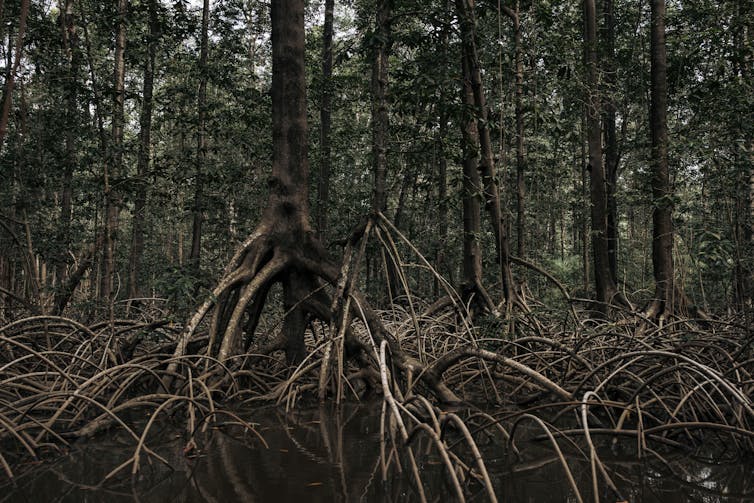From now on, the corporation’s profits will fund efforts to deal with climate change, as well as protect wilderness areas. It will, however, remain a privately held enterprise. According to initial reports about this unusual approach to philanthropy that ran on Sept. 14, 2022, Patagonia is worth about US$3 billion and its profits that will be donated in perpetuity could total $100 million every year.
The Conversation U.S. asked Indiana University’s Ash Enrici – a scholar who studies how philanthropy affects the environment – to explain why this arrangement is so significant.
1. Is this move part of a trend?
The biggest donors, those giving away billions of dollars, are increasingly making climate change a priority. Amazon founder Jeff Bezos, for example, announced in 2020 that he was putting $10 billion into his Earth Fund, and Laurene Powell Jobs, the widow of Apple co-founder Steve Jobs, said in 2021 that she would devote $3.5 billion of her fortune to fighting climate change.
Likewise, big donors are increasing their funding of conservation efforts.
In September 2021, the Earth Fund joined with eight other philanthropic powerhouses to pledge $5 billion to “support the creation, expansion, management and monitoring of protected and conserved areas of land, inland water and sea” around the world. This initiative aims to conserve 30% of Earth by 2030.
Within days of Chouinard’s announcement, another splashy climate gift emerged, setting a similar precedent. Filmmaker Adam McKay said he will donate $4 million he made from the movie “Don’t Look Up,” which he wrote, co-produced and directed. Those proceeds from his satirical film, which was a metaphor regarding climate inaction, will fund a climate activism group.
No matter how frequently these donations occur, it’s important to keep in mind that the cost of meeting the world’s environmental challenges is enormous and will cost trillions of dollars. So while all of these gifts are certainly significant in their scale, donors and governments will need to do and spend much more.
2. What makes it stand out?
What’s unusual about Chouinard’s climate-change gift is its structure. By giving away his company and directing that the profits be spent fighting climate change in the long term in the form of regular installments, he is creating a new model for large-scale donations.
It also sets a notable precedent. Chouinard and his family are giving away the source of their wealth and setting things up in a way that is going to result in a predictable form of support for work on climate issues – an estimated $100 million each year from Patagonia’s profits.
I think it’s a great example for other business owners and very wealthy people to follow.
3. How are conservation and climate change efforts connected?
Journalists, scholars and the public often treat addressing climate change and conserving ecosystems as being two distinct priorities. But they are instead closely related. Having ecosystems thrive in a way that protects biodiversity is a way to slow the pace of climate change.
Climate change itself will harm ecosystems and contribute to the loss of biodiversity through, for example, raising temperatures in large bodies of water to the point where established marine ecosystems become so disrupted that many species die off.
And the flip side of that is that maintaining healthy ecosystems can help counter climate change. For example, mangroves are often cut down for shrimp farming and other industries. But protecting them offers the potential to retain as much, or more, carbon as tropical rain forests, while also safeguarding the animals and plants on the land and in the water.

4. What do you think this money should fund?
To me, how they – the newly minted Patagonia Purpose Trust, which will own and run the company, and the Holdfast Collective, the nonprofit funded by Patagonia’s profits – operate will be just as important as what they fund.
Based on research I’m engaged in, I believe that they can do more good by reflecting on how they work, hopefully in ways that are both equitable and effective. For example, they can consider highly collaborative approaches, incorporate flexibility for adapting circumstances and long-term funding to match ecological timescales. It’s also essential that indigenous people living in the places affected by environmental work have a say and are heard.
Because the Holdfast Collective is a social welfare group, rather than a charity, it will be free to emphasize policy reform – which I think should be a major priority.
Government and international aid agencies are often too constrained by bureaucracy to be able to adapt and adjust their practices in a way that might be needed to address urgent environmental challenges.
Philanthropists are more free in terms of how they work. That means funders like Patagonia’s trust can provide seed money to jump-start new initiatives that later may be more heavily funded and scaled up by governments.
5. Why are many people troubled by gifts like this?
In recent years, scrutiny of philanthropy of all kinds has been on the rise. Some of the criticism takes aim at big donors, like Bezos, whose sources of wealth contribute to the problems their gifts are supposed to be solving.
Concerns about how philanthropy can perpetuate or excuse discrimination and oppression are also growing, leading to calls for its “decolonization.”
Even avid environmentalists are expressing deep concerns about the potential downsides of this new model. They’re asking whether it might be used to fund causes championed by other wealthy donors with starkly different agendas.
Regardless of what concerns you may have about what the Chouinard family decided to do, or regarding other billion-dollar donations that take aim at climate change, one thing is for sure: The cost of doing nothing at all will surely be much higher than taking action, however imperfectly.
Ash Enrici, Assistant Professor of Philanthropic Studies, Indiana University
This article is republished from The Conversation under a Creative Commons license. Read the original article.
![]()